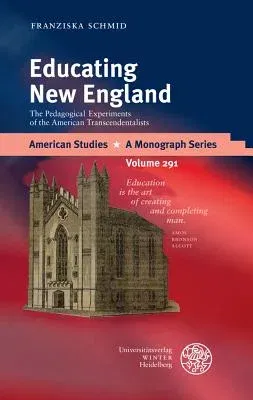Franziska Schmid
(Author)Educating New England: The Pedagogical Experiments of the American TranscendentalistsHardcover, 25 April 2018

Qty
1
Turbo
Ships in 2 - 3 days
Only 4 left
Free Delivery
Cash on Delivery
15 Days
Free Returns
Secure Checkout

Part of Series
American Studies - A Monograph
Print Length
247 pages
Language
English
Publisher
Universitatsverlag Winter
Date Published
25 Apr 2018
ISBN-10
3825368653
ISBN-13
9783825368654
Description
Product Details
Author:
Book Format:
Hardcover
Country of Origin:
US
Date Published:
25 April 2018
ISBN-10:
3825368653
ISBN-13:
9783825368654
Language:
English
Location:
Heidelberg
Pages:
247
Publisher: